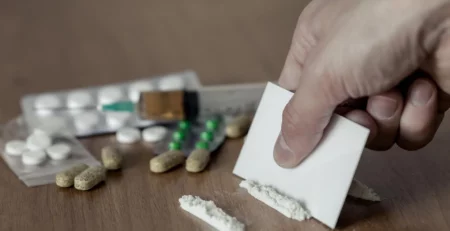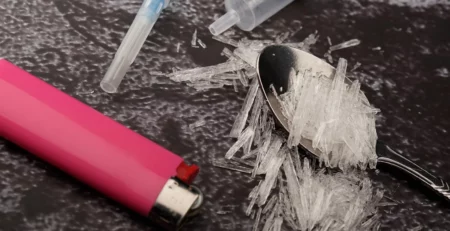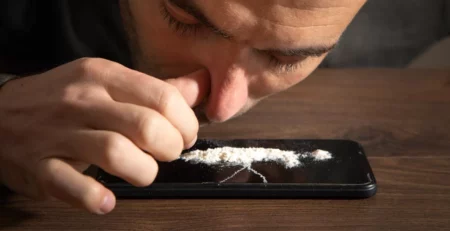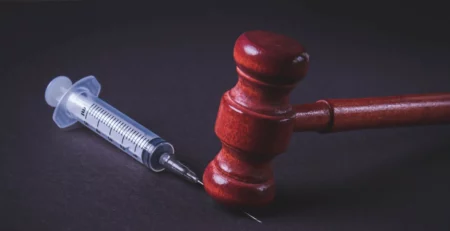Can Drugs Seep Through Your Pores?
Detecting the Odor of Drug Use From a Loved One’s Sweat
Have you ever hugged or come into close contact with someone and noticed a strong, unfamiliar scent coming from their body? It may resemble a chemical, sour, or metallic odor. This is far more common than you might be aware of, mainly if the scent emanates through the pores of someone who has a history of substance abuse.
This begs the question: Can drugs seep through your pores? Certain substances and their byproducts can be excreted through the skin, typically in sweat, carrying an odor that is often easily detectable.
Recognizing the smell of drug use might sound like an unreliable detection method, but it’s a very real occurrence. Understanding how drugs interact with the body and how their leftovers can be released from the body through sweat can help you find recovery for a loved one before noticing the typical signs of drug abuse, and sobriety becomes much harder.
How Drugs Leave the Body: The Role of Sweat

When a person struggles with substance use disorder, the body automatically begins the process of eliminating these foreign substances. Because the liver and kidneys act as the primary detox mechanisms for the body, most drugs are processed into water-soluble compounds and excreted through the urine or feces.
However, a lesser-known exit route is the skin, directly through the sweat glands. When the body heats up or an individual becomes more active or agitated, sweating increases, and small amounts of drug metabolites (the byproducts of broken-down drugs) are released onto the skin’s surface.
That said, this doesn’t happen with all drugs. But certain substances are known to exit the body in ways that we can smell or observe, especially when drug use is frequent or in larger quantities.
Get Effective Drug Detox and Rehab Options at Icarus
Which Drugs Are More Present In Sweat?
Sweat-based drug testing is used in some clinical and legal settings because it’s non-invasive and can detect drug use over time. These are some of the drugs that are excreted, giving off a noticeable odor:
Methamphetamine
One of the most notable drugs for smelling, methamphetamine often gives off an ammonia-like, chemical, or metallic scent. Sweat from methamphetamine may also carry a distinct, industrial scent.
Heroin
Heroin users typically emit a vinegar-like smell because of the body metabolizing heroin into acetic acid.
Marijuana (THC)
While THC is mostly fat soluble and is excreted more slowly than most drugs, it still leaves a sweet, skunky, or even musty smell in the user’s sweat.
Alcohol
When consumed in heavier doses, alcohol produces a sour, yeast-like, or fermented odor in sweat and breath.
Cocaine
Cocaine rarely causes a strong odor through sweat, but users may still sweat excessively or give off a sharp chemical smell during withdrawal or intense, long-term binges.
MDMA/Ecstasy
Both of these drugs can cause profuse sweating and sometimes produce a sickly-sweet or plastic scent in the user’s sweat.
Does Sweat Actually Smell Like the Drug Itself?

Because what you’re smelling are the metabolites and not the actual drugs themselves, the scent in the sweat may not be similar to the raw drug itself. The metabolites often interact with the body’s natural oils and bacteria, creating unusual or distinct scents.
For example, someone using meth may not smell like a bag of methamphetamine, but they might emit a pungent, chemical sweat similar to acetone or burnt plastic. Similarly, a person using heroin might develop a body odor that’s subtly acidic or sour, like vinegar.
It’s worth noting that not all users will experience a smell, and additional factors, such as hygiene, metabolism, and total dosage, can play a substantial role. However, if you begin to notice a persistent, odd odor that wasn’t present before drug use began, it may be cause for concern.
Physical Symptoms that Accompany Smelly Sweat
Smelly sweat is just one possibility when it comes to detecting drug use. Additional physical signs to watch for that occur alongside this issue include:
- Particularly heavy sweating
- Clammy, greasy skin
- Unusual skin conditions, including sores or acne from meth use
- Overheating or flushed skin is a sign of stimulant use
- Dry mouth or body odor masked with perfume or cologne
- Sweat may stain clothing, or you might notice a buildup of residue on bedsheets and pillowcases
Get Accredited Treatment Programs at Icarus – Call Now!
Behavioral Clues that Align With Unusual Odor
Often, the odor alone isn’t enough to be sure. However, when paired with behavioral changes, the situation becomes much more telling:
- Irritability and mood swings
- Paranoia or anxiety
- Erratic sleep patterns
- Avoiding being near friends and family
- Frequent showers (or none at all, depending on the lifestyle)
- Sudden overuse of deodorant or cologne to cover body smells.
You must trust your instincts when dealing with a potential substance use case. If someone close to you suddenly begins to smell different and/or act differently, it might be more than just a change in detergent or deodorant.
When Should You Be Concerned?

Everyone sweats and has some form of body odor. But not everyone smells like chemicals, metal, or an unnatural sour substance. Here’s when it’s time to consider the possibility of drug use:
- If you notice persistent, unusual odors coming from the person’s sweat, breath, or clothes.
- Major personality shifts and erratic mood swings accompany the odor.
- They avoid everyday hygiene practices, drastically shift sleep patterns, or keep secrets.
- Noticeable signs of paranoia, twitching, or jaw clenching. These are all common signs of stimulant use.
- They appear to be ill, with no clear illness identified.
Document even the most insignificant changes in patterns and characteristics. This can help you identify a pattern that enables you to present information effectively to a professional when seeking help.
How to Approach a Loved One With Your Concerns
Bringing up drug use is never an easy conversation. Here are several ways to approach the subject without seeming confrontational:
- Choose a calm, private time to talk
- Speak from a place of concern instead of judgment
- Avoid statements like “You’re using” or “I can smell drugs on you.” Instead, describe what you’ve noticed: “I’ve identified a strong smell lately, and I just want to make sure you’re okay.”
Offer to help. Encourage testing, therapy, or speaking to any type of behavioral or substance use specialist.
If the conversation becomes hostile or defensive, refrain from pushing it further. Step back and try again later, or consider involving a professional mediator.
Treatment Options for Substance Use

If it turns out your loved one is using drugs, know that help is available and recovery is possible. Here are some of your most efficient options:
- Detox programs are available at Icarus Behavioral Health in Nevada. This is especially helpful for substances like heroin, alcohol, or benzodiazepines to manage withdrawal safely.
- Inpatient rehab is available for 24/7 support in the most severe cases.
- Outpatient counseling for people not ready to commit to full-time care.
- Family therapy and support groups (Al-Anon, Nar-Anon, SMART Recovery, etc.)
Nobody ever wants to assume the worst, but ignoring signs can lead to more damage. Early detection and treatment can save lives.
Up To 100% of Rehab Costs Covered By Insurance – Call Now!
Icarus in Nevada: Get Help With Identification and Intervention
Drugs seeping through the pores can be the first silent warning that a loved one is battling substance abuse. While not all drugs create detectable odors, and not every substance will smell the same, paying attention to changes in a loved one’s sweat, skin, and scent can offer valuable clues.
If you suspect drug use, don’t ignore your instincts. Contact a member of the admissions team at Icarus Behavioral Health Nevada today.
We offer top-notch support, including multiple professional treatment options, as well as aftercare resources to help you stay on track for long-term recovery.













